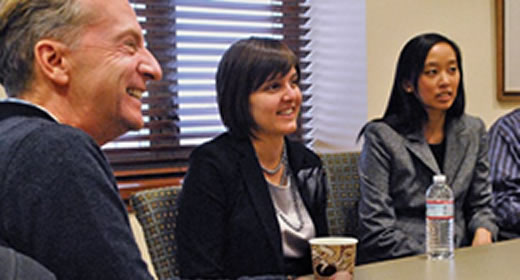
Bohnett Fellows learn to devise policy inside Detroit mayor's office
Elizabeth Palazzola and Julie Schneider knew Detroit pretty well even before last summer. Then they learned a whole new side of it—the inside—as members of Mayor Dave Bing's administration.
"I've worked in Detroit in various capacities—with nonprofits, city agencies, state agencies, with the public on events and environmental issues—but what was really missing was the mayor's office," said Palazzola, who spent three years as a research assistant at Wayne State University's Center for Urban Studies.
"That was what I was most excited about, filling in that blank. I think now having done so I have an even greater appreciation for the city."
Giving talented, aspiring public servants experience in city government is the purpose of the David Bohnett Public Service Fellowship program. Palazzola and Schneider earned the distinction of becoming the Ford School's inaugural Bohnett Public Service Fellows after each had "I expected the mayor's office to be a fast-paced environment, but in retrospect did not appreciate the daily demands on the executive staff," Schneider said. "I gained an understanding of day-to-day operations and a greater respect for the team that carries them out."
Palazzola and Schneider focused their energies on land use, housing, and sustainability projects.
"People who work and live in the city are very interested in environmental issues," Palazzola said. "I think if you asked a random person around the United States, they would say Detroit is one of the dirtiest cities, not one of the greenest, and people are working to change that."
Palazzola's main project was to recommend ways to expand the city's curbside recycling services. After evaluating two pilot programs, she found it might be most efficient for the city to partner with community based education programs, such as Recycle Here!, that already provide recycling services.
There's a difference between the cost of just putting a bin on the curb and picking it up and having a successful program, which has this whole outreach and education side. I think I was able to come up with some good figures," Palazzola said. "Programs that were perceived to be inexpensive actually had major costs."
Palazzola and Schneider also teamed up to investigate one of Detroit's most distressing problems—homeowners losing their homes due to unpaid property taxes. Schneider spearheaded relevant statistical analysis and spatial data mapping using Geographic Information Systems (GIS).
"Foreclosure prevention programs have been focused on mortgage foreclosures, but tax foreclosures in Detroit have increased in recent years," Schneider said. "Tax foreclosures present neighborhood stability and financial issues that rival the mortgage crisis. It's challenging because Detroit is now managing this issue on a greater scale than any other city."
The challenges weren't limited to the policies themselves. The political battles and administrative intricacies of city hall complicated the projects as well. Mayor Bing's contentious and drawn-out budget battle with the city council made it hard to get ahold of key officials at times, Palazzola said.
"It was interesting to be inside the mayor's office at that time because it was good to see how things work, how different people's leadership styles work," she said. "There's a down side to that, though. It was an allconsuming topic, and so during those several weeks it was really hard to get anyone's attention to move forward on any of the projects."
Getting the plentiful number of stakeholders, within city hall and without, on the same page also slowed momentum. "It affects every process at every level," Schneider said of bureaucracy. "Coming in, just learning those processes was one of the challenges of being in that environment."
Both women relied on relationships from their prior work in Detroit to navigate hurdles that would have stymied less resourceful newcomers. Palazzola, while at Wayne State, had worked with her internship supervisor, Karla Henderson, city group executive for planning and facilities.
"It was nice to report to work the first day and hear, 'Hey, Betsy, how are you doing?'" said Palazzola, who also had contacts with city agencies and environmental groups. "It's a lot easier to ask, 'What do you think of this program?' When they know who you are, it makes that conversation go much more smoothly."
Schneider previously worked for Michigan AmeriCorps Partnership on Detroit's east side and in donor relations for the Detroit Symphony Orchestra, but it was the job she still holds—as softball coach at Cass Technical High School—that may have boosted her credibility most.
"I think I was more easily accepted by other people; I was 'one of them,'" she said. "That was helpful, especially since some of them were (Cass Tech) alums."
That network continues to grow with the incoming class of Ford School Bohnett Public Service Fellows: Stephanie Chang, who was Palazzola's minority peer advisor during undergrad at U-M, and Diana Flora, who knew Schneider through the Detroit Economic Growth Corporation.
Asked how she would advise her successors, Palazzola didn't hesitate. "City officials often have great ideas; they just need help moving their projects along. Find them," she said. "If those officials know what they want to accomplish and how you can help them, you will be able to contribute a lot."
Below is a formatted version of this article from State & Hill, the magazine of the Ford School. View the entire Winter 2012 State & Hill here.